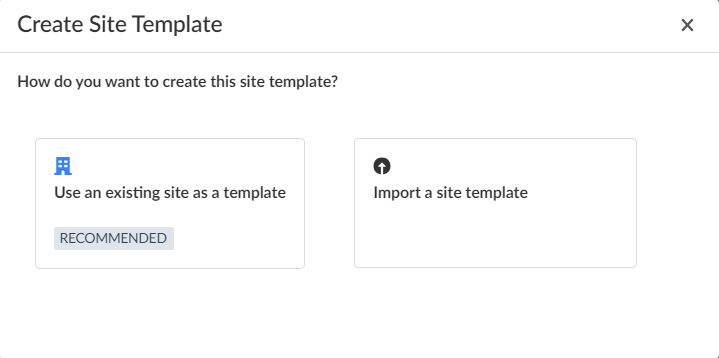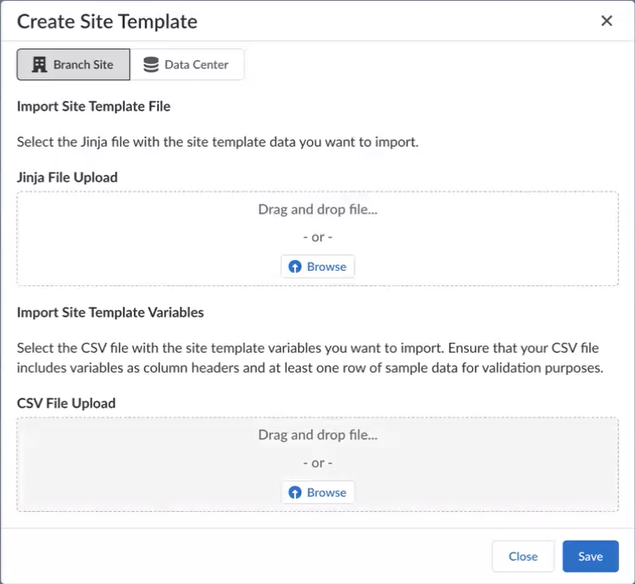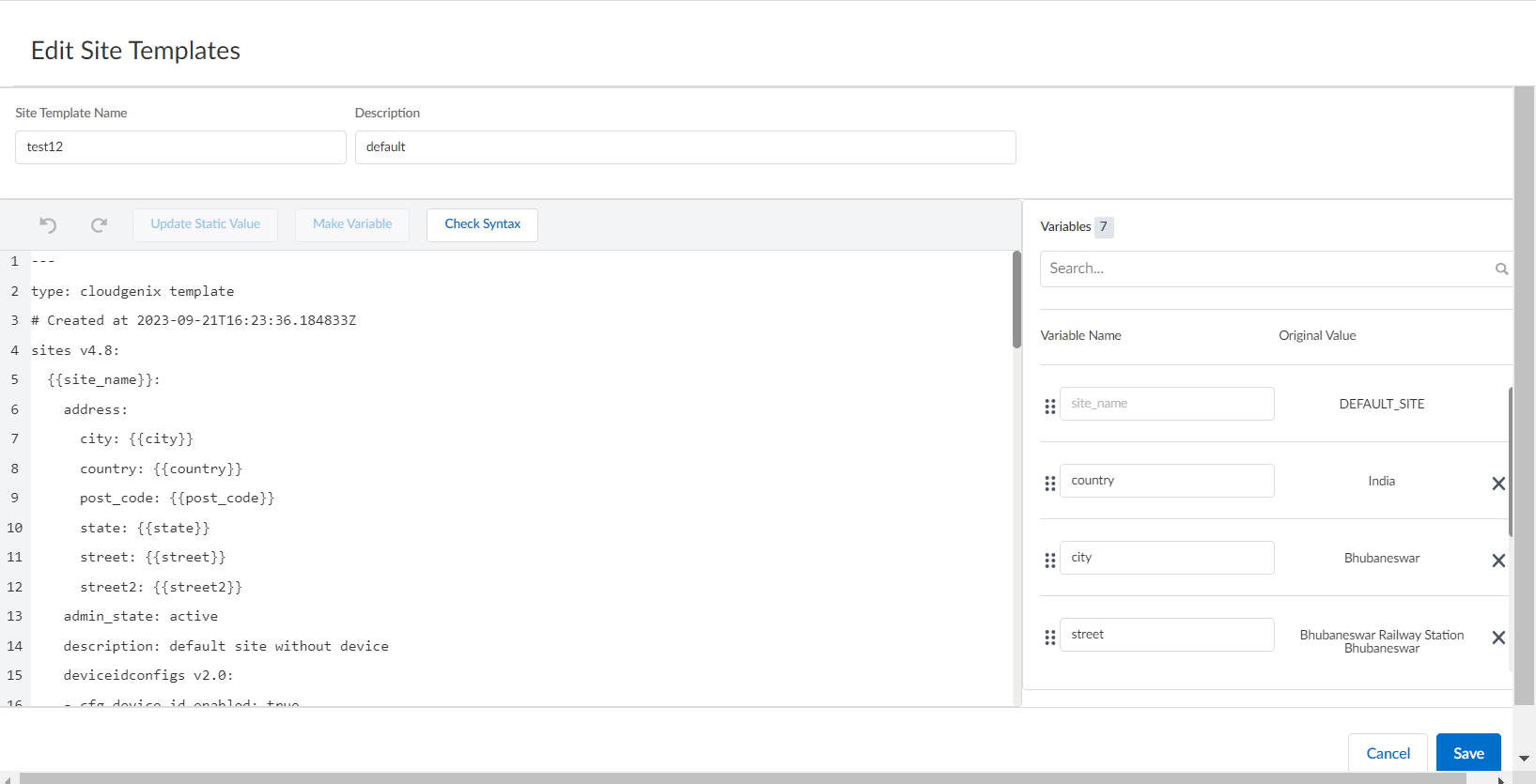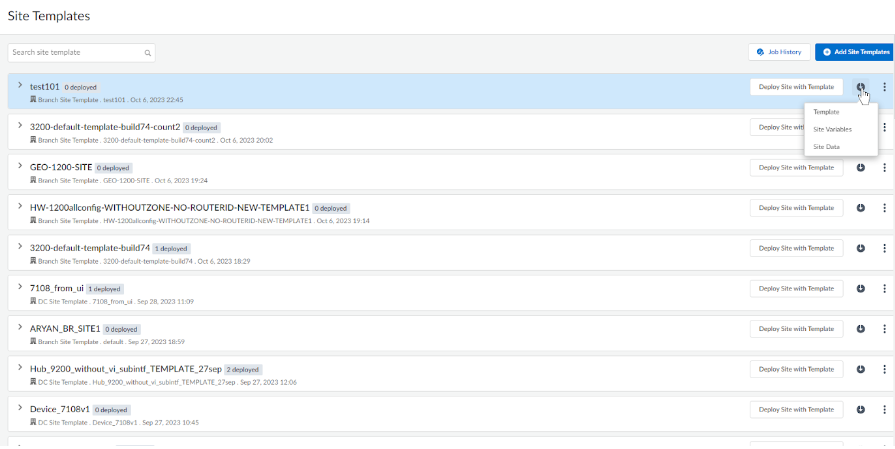Prisma SD-WAN
Create a Site Template
Table of Contents
Expand All
|
Collapse All
Prisma SD-WAN Docs
-
-
- Prisma SD-WAN Key Elements
- Prisma SD-WAN Releases and Upgrades
- Use Copilot in Prisma SD-WAN
- Prisma SD-WAN Summary
- Prisma SD-WAN Application Insights
- Device Activity Charts
- Site Summary Dashboard
- Prisma SD-WAN Predictive Analytics Dashboard
- Prisma SD-WAN Link Quality Dashboard
- Prisma SD-WAN Subscription Usage
-
-
- Add a Branch
- Add a Data Center
- Add a Branch Gateway
- Secure Group Tags (SGT) Propagation
- Configure Circuits
- Configure Internet Circuit Underlay Link Aggregation
- Configure Private WAN Underlay Link Quality Aggregation
- Configure Circuit Categories
- Configure Device Initiated Connections for Circuits
- Add Public IP LAN Address to Enterprise Prefixes
- Manage Data Center Clusters
- Configure Secure SD-WAN Fabric Tunnels between Data Centers
- Configure a Site Prefix
- Configure Ciphers
- Configure a DHCP Server
- Configure NTP for Prisma SD-WAN
- Configure the ION Device at a Branch Site
- Configure the ION Device at a Data Center
- Switch a Site to Control Mode
- Allow IP Addresses in Firewall Configuration
-
- Configure a Controller Port
- Configure Internet Ports
- Configure WAN/LAN Ports
- Configure a Sub-Interface
- Configure a Loopback Interface
- Add and Configure Port Channel Interface
- Configure a PoE Port
- Configure and Monitor LLDP Activity and Status
- Configure a PPPoE Interface
- Configure a Layer 3 LAN Interface
- Configure Application Reachability Probes
- Configure a Secondary IP Address
- Configure a Static ARP
- Configure a DHCP Relay
- Configure IP Directed Broadcast
- VPN Keep-Alives
-
- Configure Prisma SD-WAN IPFIX
- Configure IPFIX Profiles and Templates
- Configure and Attach a Collector Context to a Device Interface in IPFIX
- Configure and Attach a Filter Context to a Device Interface in IPFIX
- Configure Global and Local IPFIX Prefixes
- Flow Information Elements
- Options Information Elements
- Configure the DNS Service on the Prisma SD-WAN Interface
- Configure SNMP
-
-
- Prisma SD-WAN Branch Routing
- Prisma SD-WAN Data Center Routing
-
- Configure an OSPF in Prisma SD-WAN
- Enable BGP for Private WAN and LAN
- Configure BGP Global Parameters
- Global or Local Scope for BGP Peers
- Configure a Route Map
- Configure a Prefix List
- Configure an AS Path List
- Configure an IP Community List
- View Routing Status and Statistics
- Distribution to Fabric
- Host Tracking
-
- Configure Multicast
- Create, Assign, and Configure a WAN Multicast Configuration Profile
- Configure Global Multicast Parameters
- Configure a Multicast Static Rendezvous Point (RP)
- Learn Rendezvous Points (RPs) Dynamically
- View LAN Statistics for Multicast
- View WAN Statistics for Multicast
- View IGMP Membership
- View the Multicast Route Table
- View Multicast Flow Statistics
- View Routing Statistics
-
- Prisma SD-WAN Branch HA Key Concepts
-
- Configure Branch HA with Gen-1 Platforms (2000, 3000, 7000, and 9000)
- Configure Branch HA with Gen-2 Platforms (3200, 5200, and 9200)
- Configure Branch HA with Gen-2 Embedded Switch Platforms (1200-S or 3200-L2)
- Configure Branch HA for Devices with Software Cellular Bypass (1200-S-C-5G)
- Configure Branch HA for Platforms without Bypass Pairs
- Configure Branch HA in a Hybrid Topology with Gen-1 (3000) and Gen-2 (3200) Platforms
- Configure HA Groups
- Add ION Devices to HA Groups
- Edit HA Groups and Group Membership
- Prisma SD-WAN Clarity Reports
-
-
CloudBlade Integrations
- CloudBlade Integrations
- CloudBlades Integration with Prisma Access
-
-
-
-
- clear app-engine
- clear app-map dynamic
- clear app-probe prefix
- clear connection
- clear device account-login
- clear dhcplease
- clear dhcprelay stat
- clear flow and clear flows
- clear flow-arp
- clear qos-bwc queue-snapshot
- clear routing
- clear routing multicast statistics
- clear routing ospf
- clear routing peer-ip
- clear switch mac-address-entries
- clear user-id agent statistics
-
- arping interface
- curl
- ping
- ping6
- debug bounce interface
- debug bw-test src-interface
- debug cellular stats
- debug controller reachability
- debug flow
- debug ipfix
- debug log agent eal file log
- debug logging facility
- debug logs dump
- debug logs follow
- debug logs tail
- debug performance-policy
- debug poe interface
- debug process
- debug reboot
- debug routing multicast log
- debug routing multicast pimd
- debug servicelink logging
- debug tcpproxy
- debug time sync
- dig dns
- dig6
- file export
- file remove
- file space available
- file tailf log
- file view log
- ssh6 interface
- ssh interface
- tcpdump
- tcpping
- traceroute
- traceroute6
-
- dump appdef config
- dump appdef version
- dump app-engine
- dump app-l4-prefix table
- dump app-probe config
- dump app-probe flow
- dump app-probe prefix
- dump app-probe status
- dump auth config
- dump auth status
- dump banner config
- dump bfd status
- dump bypass-pair config
- dump cellular config
- dump cellular stats
- dump cellular status
- dump cgnxinfra status
- dump cgnxinfra status live
- dump cgnxinfra status store
- dump config network
- dump config security
- dump controller cipher
- dump controller status
- dump device accessconfig
- dump device conntrack count
- dump device date
- dump device info
- dump device status
- dump dhcp-relay config
- dump dhcprelay stat
- dump dhcp-server config
- dump dhcp-server status
- dump dhcpstat
- dump dnsservice config all
- dump dpdk cpu
- dump dpdk interface
- dump dpdk port status
- dump dpdk stats
- dump flow
- dump flow count-summary
- dump interface config
- dump interface status
- dump interface status interface details
- dump interface status interface module
- dump intra cluster tunnel
- dump ipfix config collector-contexts
- dump ipfix config derived-exporters
- dump ipfix config filter-contexts
- dump ipfix config ipfix-overrides
- dump ipfix config prefix-filters
- dump ipfix config profiles
- dump ipfix config templates
- dump lldp
- dump lldp config
- dump lldp info
- dump lldp stats
- dump lldp status
- dump log-agent eal conn
- dump log-agent eal response-time
- dump log-agent eal stats
- dump log-agent config
- dump log-agent iot snmp config
- dump log-agent iot snmp device discovery stats
- dump log-agent ip mac bindings
- dump log-agent neighbor discovery stats
- dump log-agent status
- dump ml7 mctd counters
- dump ml7 mctd session
- dump ml7 mctd version
- dump nat counters
- dump nat6 counters
- dump nat summary
- dump network-policy config policy-rules
- dump network-policy config policy-sets
- dump network-policy config policy-stacks
- dump network-policy config prefix-filters
- dump overview
- dump performance-policy config policy-rules
- dump performance-policy config policy-sets
- dump performance-policy config policy-set-stacks
- dump performance-policy config threshold-profile
- dump poe system config
- dump poe system status
- dump priority-policy config policy-rules
- dump priority-policy config policy-sets
- dump priority-policy config policy-stacks
- dump priority-policy config prefix-filters
- dump probe config
- dump probe profile
- dump radius config
- dump radius statistics
- dump radius status
- dump reachability-probe config
- dump qos-bwc config
- dump reachability-probe status
- dump routing aspath-list
- dump routing cache
- dump routing communitylist
- dump routing multicast config
- dump routing multicast igmp
- dump routing multicast interface
- dump routing multicast internal vif-entries
- dump routing multicast mroute
- dump routing multicast pim
- dump routing multicast sources
- dump routing multicast statistics
- dump routing multicast status
- dump routing ospf
- dump routing peer advertised routes
- dump routing peer config
- dump routing peer neighbor
- dump routing peer received-routes
- dump routing peer routes
- dump routing peer route-via
- dump routing peer status
- dump routing peer route-json
- dump routing prefixlist
- dump routing prefix-reachability
- dump routing route
- dump routing routemap
- dump routing running-config
- dump routing summary
- dump routing static-route reachability-status
- dump routing static-route config
- dump routing vpn host tracker
- dump security-policy config policy-rules
- dump security-policy config policy-set
- dump security-policy config policy-set-stack
- dump security-policy config prefix-filters
- dump security-policy config zones
- dump sensor type
- dump sensor type summary
- dump serviceendpoints
- dump servicelink summary
- dump servicelink stats
- dump servicelink status
- dump site config
- dump snmpagent config
- dump snmpagent status
- dump software status
- dump spoke-ha config
- dump spoke-ha status
- dump standingalarms
- dump static-arp config
- dump static host config
- dump static routes
- dump support details
- dump-support
- dump switch fdb vlan-id
- dump switch port status
- dump switch vlan-db
- dump syslog config
- dump syslog-rtr stats
- dump syslog status
- dump time config
- dump time log
- dump time status
- dump troubleshoot message
- dump user-id agent config
- dump user-id agent statistics
- dump user-id agent status
- dump user-id agent summary
- dump user-id groupidx
- dump user-id group-mapping
- dump user-id ip-user-mapping
- dump user-id statistics
- dump user-id status
- dump user-id summary
- dump user-id useridx
- dump vlan member
- dump vpn count
- dump vpn ka all
- dump vpn ka summary
- dump vpn ka VpnID
- dump vpn status
- dump vpn summary
- dump vrf
- dump waninterface config
- dump waninterface summary
-
- inspect app-flow-table
- inspect app-l4-prefix lookup
- inspect app-map
- inspect certificate
- inspect certificate device
- inspect cgnxinfra role
- inspect connection
- inspect dhcplease
- inspect dhcp6lease
- inspect dpdk ip-rules
- inspect dpdk vrf
- inspect fib
- inspect fib-leak
- inspect flow-arp
- inspect flow brief
- inspect flow-detail
- inspect flow internal
- inspect interface stats
- inspect ipfix exporter-stats
- inspect ipfix collector-stats
- inspect ipfix app-table
- inspect ipfix wan-path-info
- inspect ipfix interface-info
- inspect ip-rules
- inspect ipv6-rules
- inspect lqm stats
- inspect memory summary
- inspect network-policy conflicts
- inspect network-policy dropped
- inspect network-policy hits policy-rules
- inspect network-policy lookup
- inspect performance-policy fec status
- inspect policy-manager status
- inspect policy-mix lookup-flow
- inspect priority-policy conflicts
- inspect priority-policy dropped
- inspect priority-policy hits default-rule-dscp
- inspect priority-policy hits policy-rules
- inspect priority-policy lookup
- inspect performance-policy incidents
- inspect performance-policy lookup
- inspect performance-policy hits analytics
- inspect process status
- inspect qos-bwc debug-state
- inspect qos-bwc queue-history
- inspect qos-bwc queue-snapshot
- inspect routing multicast fc site-iface
- inspect routing multicast interface
- inspect routing multicast mroute
- inspect security-policy lookup
- inspect security-policy size
- inspect switch mac-address-table
- inspect system arp
- inspect system ipv6-neighbor
- inspect system vrf
- inspect vrf
- inspect wanpaths
-
-
5.6
- 5.6
- 6.1
- 6.2
- 6.3
- 6.4
- 6.5
- New Features Guide
- On-Premises Controller
- Prisma SD-WAN CloudBlades
- Prisma Access CloudBlade Cloud Managed
- Prisma Access CloudBlade Panorama Managed
-
- Features Introduced in Prisma SD-WAN ION Release 5.6
- Changes to Default Behavior in Prisma SD-WAN ION Release 5.6
- Upgrade ION 9000 Firmware for Device Version 5.6.x
- CLI Commands in Prisma SD-WAN ION Release 5.6
- Addressed Issues in Prisma SD-WAN ION Release 5.6
- Known Issues in Prisma SD-WAN ION Release 5.6
Create a Site Template
Learn to create a site template.
| Where Can I Use This? | What Do I Need? |
|---|---|
|
|
Create a site template using an existing site template.
- Navigate to ManageResourcesSite TemplatesAdd Site template.
- You can use an existing site as a template (recommended) or Import a Site template.The recommended best practice is to initially creating a site with all essential configurations and validating its functionality. After the site is operational, this site can serve as a foundation for a site template. Importing a site template involves downloading previously utilized templates, adjusting them as per your requirements, and then re-importing the updated versions.
- To use an existing template, click Use an existing site as a template.

- Alternatively, Import a site template by uploading a Jinja template and the corresponding csv file.
 To import, select a Jinja template and the corresponding csv file from your local system and then Save. Ensure your CSV file contains at least one row of data, as the system will validate to ensure the output is correct.After you import the template, you cannot edit the template. To modify the template,downloadthe template, edit and then re-upload the template.When uploading a template, Jinja supports conditional statements to boost flexibility in deployments. This includes IF statements, comparisons, and replacements. If you encounter an error during upload, ensure your Jinja formatting is correct, as the system validates the uploaded CSV content against a successful YAML file format. Few examples of the conditional statements are provided below:
To import, select a Jinja template and the corresponding csv file from your local system and then Save. Ensure your CSV file contains at least one row of data, as the system will validate to ensure the output is correct.After you import the template, you cannot edit the template. To modify the template,downloadthe template, edit and then re-upload the template.When uploading a template, Jinja supports conditional statements to boost flexibility in deployments. This includes IF statements, comparisons, and replacements. If you encounter an error during upload, ensure your Jinja formatting is correct, as the system validates the uploaded CSV content against a successful YAML file format. Few examples of the conditional statements are provided below:
{%- if dhcp2.upper() == "DHCP" %} - address_family: ipv6 broadcast_address: custom_options: default_lease_time: 43200 {%- if dhcp2_description and dhcp2_description|length != 0 %} description: {{ dhcp2_description }} {%- else %} description: {%- endif %} disabled: false dns_servers: - 2001:db8:a0b:12f0::1 domain_name: gateway: ip_ranges: - end_ip: 2001:db8:a0b:12f0::220 start_ip: 2001:db8:a0b:12f0::3 max_lease_time: 86400 network_context_id: static_mappings: subnet: 2001:db8:a0b:12f0::/64 tags: vrf_context_id: Global {%- endif %} - Enter a Site Template Name and Description.The site name must be unique, duplicate entries will throw an error.
- Select Site Type, whether branch or DC.
- Select the Branch Site that you want to clone.
- Click Next.The template includes a set of attribute keys and its associated values. It comprises a predefined set of variables to facilitate deployment, encompassing essential information like site name, address, serial numbers, software version, and SNMP authentication strings, among others. The objective is to identify any additional variables necessary for unique site configuration within your site deployment. Prisma SD-WAN greatly simplifies site templates by utilizing integrated policy abstraction for items such as Path, QoS, NAT, and Security, along with objects. This minimizes the requirement for creating variables, only necessitating them for distinct items at a branch, such as LAN/WAN IP addresses or circuit settings.For every site template, the following variables are mandatory:
- Site Name: site_name
- Software Version: ion_sw_version
- Serial Number: ion_serial_number_1. For HA deployments, the templates includes variable ion_serial_number_2).
The controller will reject site data if these variables are missing from the file. After the site template is created, you can add more variables for any elements that will be unique within your site deployment.
After the site template is created, you can add more variables for any elements that will be unique within your site deployment. - Editing Variables: allows to create additional variables for values that should be unique, updating existing values to something new, and deleting default variables if they are unnecessary. The variables within the template are listed in the 'Variables' section, and they are highlighted in green text.
- Create variables: Variables serve as repositories for unique
site-specific data. You can customize these variables to align with your
site configuration. The variables in the template appear in the
Variables list highlighted in green text.
- Highlight the variable from the template.
- Make Variable is highlighted. Click Make Variable.
- In the Make Variable dialog, enter a Name for the variable.
- Apply this change to all instances in the template and Update. The selected data appears in the Variables list.
- Save your changes.
- If you want to remove a variable and make it a static value, delete the variable from the variables list. On the confirmation dialog, click OK to delete. The variable becomes a static value and the variable is removed from the variable list.
- Update Static Value:
- Highlight the variable from the template.
- Update Static Value is highlighted. Select Update Static Value.
- In the Update Static Value dialog, enter a static Value for the variable.
- Apply this change to all instances in the template and Update. The selected variable is updated with static value.
- Delete Variables:
- Enter a variable name to search in the search box.
- Delete (X) the variable which will return the original value to the template. For example, when you prefer to hard code your SNMP authentication string directly into the template, rather than using a variable. By removing the variable and updating the value directly, it offers a way to provision the SNMP settings for sites.
- Search Variables: Enter a variable name in the Search box to search.
- Check Syntax: If you have edited the variable, check the syntax of the template file. Green indicates the template has no errors.
- Create variables: Variables serve as repositories for unique
site-specific data. You can customize these variables to align with your
site configuration. The variables in the template appear in the
Variables list highlighted in green text.
Download the Site Variables
Downloading the site variables provides a reference to the necessary data
required to deploy new sites at scale using this template. You can also access
the site template, and site data (for sites already deployed) from the site
templates page.
- Select the site template you want to download.
- On the top-right corner, click the Download icon.

- Select Sites Variables. A CSV file containing all the variables defined in the template and their corresponding values are downloaded.If you choose to download the Site Template, it is downloaded in Jinja format. Site Data, for sites deployed using a template, and site variables can also be downloaded and is available in the CSV format. If there is no data, you get a notification that there is no data to export.




